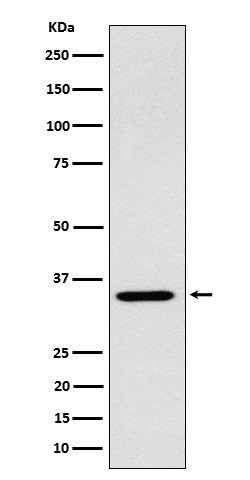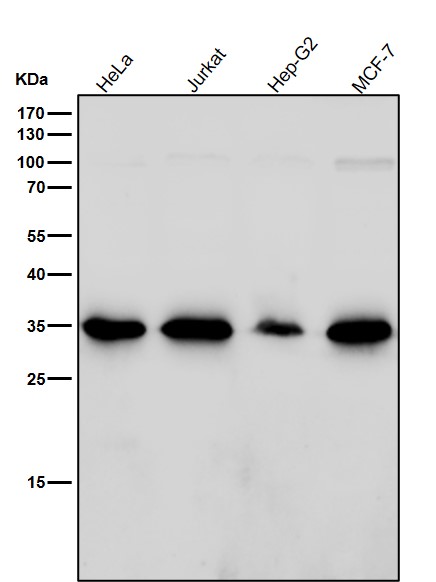


| WB | 咨询技术 | Human,Mouse,Rat |
| IF | 1/20-1/50 | Human,Mouse,Rat |
| IHC | IHC:1/100-1/200;IHF:1/50-1/200 | Human,Mouse,Rat |
| ICC | 1/50-1/200 | Human,Mouse,Rat |
| FCM | 1/20-1/100 | Human,Mouse,Rat |
| Elisa | 咨询技术 | Human,Mouse,Rat |
| Aliases | ARC34; Arpc2; p34Arc; PNAS139; PRO2446;;ARPC2 |
| WB Predicted band size | 34 kDa |
| Host/Isotype | Rabbit IgG |
| Antibody Type | Primary antibody |
| Storage | Store at 4°C short term. Aliquot and store at -20°C long term. Avoid freeze/thaw cycles. |
| Species Reactivity | Human,Mouse,Rat |
| Immunogen | A synthesized peptide derived from human ARPC2 |
| Formulation | Purified antibody in PBS with 0.05% sodium azide,0.05% BSA and 50% glycerol. |
+ +
以下是关于ARPC2抗体的3篇参考文献示例(内容为模拟概括,建议通过学术数据库核实具体文献):
1. **文献名称**:*ARPC2 regulates dendritic cell migration and stability in inflammatory responses*
**作者**:Smith A, et al.
**摘要**:研究利用ARPC2特异性抗体,揭示其在树突状细胞迁移中的关键作用,并证明ARPC2通过调控肌动蛋白聚合影响免疫细胞趋化性。
2. **文献名称**:*ARPC2 knockdown impairs invadopodia formation and breast cancer metastasis*
**作者**:Chen L, et al.
**摘要**:通过ARPC2抗体进行功能抑制实验,发现ARPC2缺失会破坏癌细胞侵袭伪足结构,抑制肿瘤转移,提示其作为潜在治疗靶点。
3. **文献名称**:*Characterization of ARPC2 in the actin-related protein complex by monoclonal antibody-based assays*
**作者**:Tanaka K, et al.
**摘要**:报道一种新型ARPC2单克隆抗体的开发,验证其在免疫印迹和免疫荧光中的应用,证实其在AR2/3复合体亚细胞定位研究中的可靠性。
如需具体文献,建议在PubMed或Google Scholar中搜索“ARPC2 antibody”或“ARPC2 function”获取最新研究。
The ARPC2 antibody is a research tool designed to detect ARPC2 (Actin-Related Protein 2/3 Complex Subunit 2), a key component of the Arp2/3 complex. This evolutionarily conserved protein complex regulates actin polymerization, a critical process for cellular motility, membrane remodeling, and intracellular trafficking. ARPC2. encoded by the *ARPC2* gene in humans, stabilizes the Arp2/3 complex and facilitates its interaction with actin nucleation-promoting factors (NPFs), enabling branched actin network formation.
ARPC2 antibodies are widely used in studies exploring cytoskeletal dynamics, cell migration, and diseases linked to actin dysregulation, such as cancer metastasis, immune disorders, and neurodegenerative conditions. These antibodies enable the detection and localization of ARPC2 via techniques like Western blotting, immunofluorescence, and immunoprecipitation. Researchers often employ them to investigate how ARPC2 expression or post-translational modifications influence cellular behaviors, signaling pathways, or pathological states.
Commercially available ARPC2 antibodies are typically raised in hosts like rabbits or mice, targeting specific epitopes within the protein. Validation includes testing for specificity (e.g., knockout cell lines) and cross-reactivity across species (human, mouse, rat). Recent studies also utilize ARPC2 antibodies to explore its role in viral pathogenesis, as some pathogens hijack the Arp2/3 complex for host cell invasion. Overall, ARPC2 antibodies serve as essential tools for dissecting actin-related mechanisms in both basic and translational research.
×